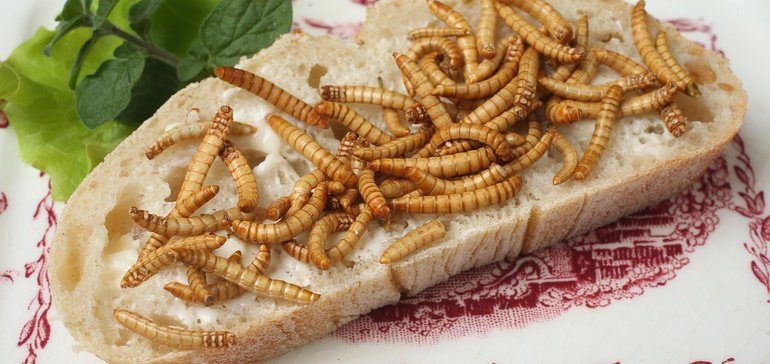Proteins in milk and mealworms have similar positive attributes, study finds

Dive Brief:
- A study by researchers at Maastricht University found mealworm protein has many of the same attributes as milk protein, according to a press release.
- The report, published in The American Journal of Clinical Nutrition, evaluated both proteins and determined that mealworm performs the same as milk when it comes to digestion, absorption and the ability to stimulate muscle growth. The study also showed mealworm protein contains all nine essential amino acids. Insect protein company Ynsect provided its Buffalo mealworm for the research.
- Although it is currently a niche sector, the edible insect market could top $522 million by 2023, according to Global Market Insights. Beetles, grasshoppers, locusts and crickets are leading the pack.
Dive Insight:
Plant-based proteins have been sometimes criticized for lacking the same nutritional profile as other protein sources like animals. Although plants such as soy and yellow peas may offer higher protein contents compared to other non-animal sources, many have posed challenges for food manufacturers around taste and texture.
Insects are emerging as a potential solution to both problems. With an attractive nutritional profile, the Maastricht University study found mealworms may offer a way for health-conscious consumers to opt for alternative protein without compromising their nutrition. Researchers have previously shown, for example, that water-soluble extracts of edible grasshoppers, silkworms and crickets have an antioxidant capacity five times greater than fresh orange juice.
Mealworm larvae also have been highlighted as a potential ingredient that could improve the texture of snacks while upping the protein content, according to Food Navigator.
Sustainability, which is a growing concern among consumers deciding what products to buy when they shop, could be another benefit to help spur demand for insects. Ynsect recently commissioned a life-cycle analysis study that concluded its mealworm production is carbon negative.
Creating insect protein may offer more efficiency compared to animal protein, too, with some sources claiming insects are better at converting feed into protein compared to other food animals.
Despite the potential benefits of insect protein, consumer acceptance remains a challenging hurdle for the sector. A 2017 study from Wageningen University in the Netherlands found Western consumers struggle to eat bugs even if they are processed, freeze-dried, or blended into food. Only half of consumers in the study were willing to try insect proteins.
Questions around regulatory approval for edible insects also create some uncertainty. The E.U. food safety agency approved certain dried mealworms for human consumption in January 2021, Politico noted. The U.S. and many other markets currently lack a framework for regulating bugs intended for human consumption. Approval in additional jurisdictions may help assuage some consumers’ concerns over eating bugs and encourage new food makers to join the sector.
Ynsect, which currently manufacturers mealworm protein for the pet food and animal feed sectors, plans to make its entry into the human food space through sports nutrition-oriented products, according to AgFunderNews. But even if it can make a compelling case to consumers, it will need regulatory approval in additional jurisdictions if it plans to scale to new markets outside the E.U.
A number of other startups are currently producing insect protein such as Seattle’s Beta Hatch, which converts mealworms and their waste into high-value proteins, oils and nutrients for agriculture. Protix is working with black soldier fly larvae while Cricket One is producing a burger patty made only with cricket protein and plants.
Source: fooddive.com

